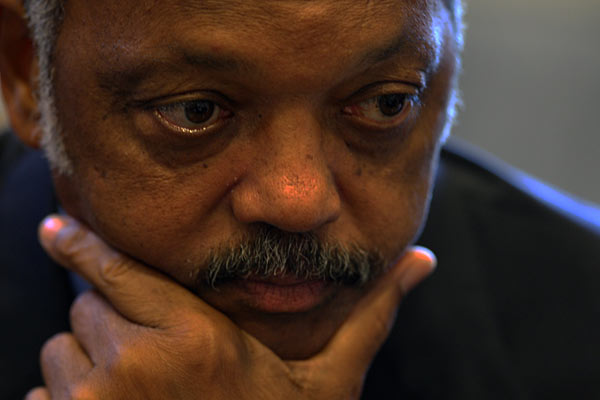
As previously reported, Jesse Jackson, Sr., met Wednesday night at his Rainbow PUSH headquarters with Danny Davis and Carol Moseley Braun, the two leading African American candidates for mayor. The purpose, Jackson told me in a telephone conversation Thursday morning, was to get them talking-to jump start the dialogue about one of them dropping out to give the survivor a chance to turn the momentum that has been building for Rahm Emanuel. Jackson predicted that the two “old friends” will reach an agreement: “There’s nothing hostile or petty about their relationship….They left the meeting on good terms.” Here’s the rest of what Jackson told me.
Q: What happened last night?
A: What’s interesting about Danny and Carol is that they share the same values….They must make a big political decision.
Q: Did you agree on any deadline or benchmark—for example, poll numbers, fundraising totals—that will determine who stays on the ballot and who goes?
A: I’m confident that they are committed enough to change and hope, right and justice, they’ll make that decision. We who support them must give them the time and latitude to make the decision that they must make and configure a shared plan for winning. The burden is on them.
Q: Do you have another meeting planned?
A: In the future the meetings will be private….I’m available to both, but this is their decision to make and I support the outcome.
Q: You mentioned your unhappiness with the media coverage of this campaign. Can you elaborate?
A: When the focus is so much on attacking them, not discussing home foreclosures, not discussing lack of access to public transportation, not discussing the fact that the unemployment rate [in African-American neighborhoods] is three times the national rate, their struggle will be to break through the fourth estate. There’s an attempt for the media to create its own agenda. We must help them fight through that.
Q: What do you make of the flap over [Sun-Times] columnist Neil Steinberg’s column on Carol Moseley Braun?
A: [Jackson chose not to respond to Steinberg specifically.] Political power is a big deal, but [media] power is a bigger deal. At least the politicians are accountable to the voters. Those who write the editorials and those who write the columns, they simply are unaccountable. They’re free to impose their cultural politics in the name of freedom of the press….The good news is for Congressman Davis and Ambassador Moseley Braun, they will not panic in the face of that. That’s the real challenge: getting the message through….You need three things: you need message, machinery, and money. They have the message. You have to have the money to get the machinery. That’s what the people who are pulling for them must put up to enable them to help us achieve our interests.
Q: You’re saying that the press is in Rahm’s corner?
A: The press has a predisposition. The night that Harold [Washington] won, Walter Jacobson said on air [addressing a panel of his colleagues], `We all missed the potential for him to win. The Sun-Times missed it, the Tribune, Channels 2, 5, 7, 9 missed it. How did all of us miss it?’ He looked down the line and there were six white male reporters. The fact is, for them life stops at 35th Street. Half of Chicago lives south of 35th Street and west of the Dan Ryan.
Q: What about the irritated response from both Davis and Moseley Braun to Bill Clinton coming to town to campaign for Rahm Emanuel?
A: Both candidates found it to be strange….Not Democrats vs. Republicans, but here are our friends and political allies, …family members. He chose, it seems, Rahm over Danny and Carol and del Valle and Chico. He chose Emanuel over the two most loyal communities to him from Arkansas to Washington. It’s a bit disappointing, but that, too, will pass.”
Q: Have you spoken to Bill Clinton?
A: No.
Q: The press has made much of the fact that Moseley Braun is from the South Side and that Davis is from the West Side and sometimes seems to attribute different values and goals and even voting turnout to the two. Is this division significant politically?
A: I think at the end of the day the Dan Ryan Highway does not define life. Whether you’re living in Lawndale or Roseland, you’re facing home foreclosures. Whether you’re living in Lawndale or Roseland, you’re facing less access to health care….The unemployment on the West Side and the South Side is around 27 percent. At the end of the day, we’re defined by our predicament, not by the sides of town.
Photograph: Chicago Tribune photo by Milbert O. Brown


